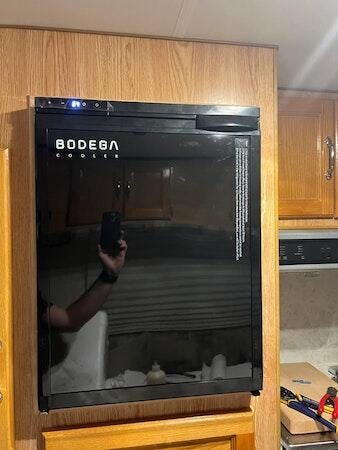Traveling in an RV is an exciting adventure, and having the convenience of a refrigerator on board is essential for a comfortable journey. But can you run a residential refrigerator in an RV while driving? Let's delve into this question and explore the possibilities.
Understanding the Basics: Residential vs. RV Refrigerators

Before we dive into the logistics of running a residential refrigerator in an RV fridge, it's crucial to understand the fundamental differences between residential and RV-specific refrigerators.
1. Power Consumption:
- Residential refrigerators typically require more power than their RV fridge, which are designed to operate on both propane and electricity.
2. Size and Space:
- RV refrigerators are specifically crafted to fit the limited space within an RV, ensuring optimal storage without sacrificing mobility.
3. Dual Power Source:
- RV refrigerators offer the flexibility when off-grid and switching to electricity when connected to a power source.
Can You Run a Residential Refrigerator While Driving?
The short answer is yes, but several factors need to be considered to ensure a smooth and safe operation.
1. Power Source:
- Residential refrigerators typically run on standard household electrical outlets. To use one in an RV while driving, you'll need an inverter that converts your RV's 12-volt DC power to 110-volt AC power, providing the necessary electricity for the residential refrigerator.
2. Inverter Capacity:
- Ensure that the inverter you choose has sufficient capacity to handle the power requirements of your residential refrigerator. Check the refrigerator's specifications for its wattage, and select an inverter with a higher capacity to accommodate startup surges.
3. Battery Capacity:
- Running a residential refrigerator while driving will draw power from your RV's batteries. Make sure your RV has adequate battery capacity, and consider upgrading to deep-cycle batteries for extended usage.
4. Monitoring Power Consumption:
- Keep a close eye on your RV's power consumption, especially if you're running other appliances simultaneously. Avoid draining the batteries excessively to prevent any disruptions to your journey.
Read more: Should You Get An RV Fridge For Your Mercedes Sprinter?
Tips for Running a Residential Refrigerator in Your RV
1. Secure the Refrigerator:
- Use straps or bungee cords to secure the refrigerator in place, preventing any movement or potential damage while the RV is in motion.
2. Temperature Settings:
- Adjust the temperature settings of the refrigerator to ensure optimal cooling without overworking the appliance.
3. Ventilation:
- Allow proper ventilation around the refrigerator to prevent overheating. Ensure that vents are unobstructed for efficient heat dissipation.
Read more: Can You Run Your RV Fridge on Battery While Driving?

Conclusion
In conclusion, running a residential refrigerator in an RV while driving is possible with the right setup. However, it comes with considerations related to power, space, and safety. Evaluate your RV fridge electrical system, invest in a suitable inverter, and take necessary precautions to enjoy the convenience of a residential refrigerator on the road.
FAQs
Q1: Can I run the residential refrigerator on propane while driving?
Residential refrigerators are designed to run on electricity, and using propane while driving is not recommended. Ensure a reliable power source with an inverter.
Q2: How do I determine the right inverter capacity for my refrigerator?
Check the refrigerator's wattage requirements and choose an inverter with a capacity higher than the specified wattage to accommodate startup surges.
Q3: Can I install a residential refrigerator in any RV?
It's possible with some modifications, but consider the size, power requirements, and compatibility with your RV's electrical system.
Q4: Should I turn off the residential refrigerator while driving?
While it's possible to run the refrigerator while driving, turning it off during short trips can conserve battery power.
Q5: Are there specific safety concerns when running a residential refrigerator in an RV while driving?
Ensure the refrigerator is securely strapped, monitor power consumption, and follow safety guidelines to prevent accidents or damage.







